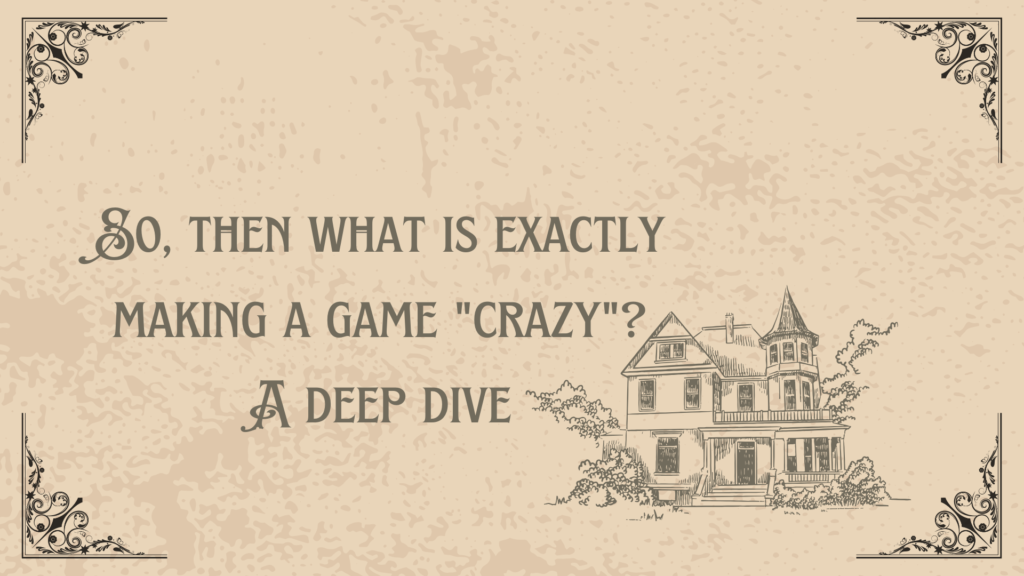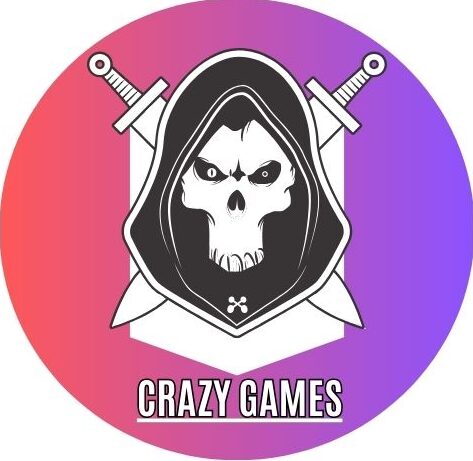Table of Contents
Introduction
Games have played along with mankind’s history as a significant source for over thousand years. This ranges from just card games through the marathon spree of video-gaming to this adrenaline-riddled high-speed play in sports-whatever it was- one’s mind just exploded from the gulf. Made to scream ecstatically, hysterically laughable or have beats pumping inside his veins with expectations. But what exactly is the stuff that makes a game “crazy”? The plot twists, the graphics of another world, adrenaline rush, or something much deeper?
This article will be on the “crazy game” by trying out so many kinds of games which do not fit the video game, board game, sport, or even traditional game genres. We are going to explore what makes them memorable, thrilling, and sometimes wanting more.

1. Art of Game Design: Creating Chaos What Makes a Game “Crazy”?
A “crazy” game often amazes the set-in-their-ways boundary of the design. That is, it can surprise players by every turn of the game in unexpected challenges or has mechanics that just do not live up to expectations. A game simply crazy could mean one that really pushes the player out of his comfort zones at times-forced to think on their feet and take split-second decisions.
It is fantastic how well one could remember the first play experience with Super Mario Bros. on NES. Jumping from one platform to another was very simple, but then came the twist: a massive plant, which would leap out of pipes to devour me. Then every move was a gamble:
would the next jump be safe or something new?
That was my first taste of a really “crazy” game.
This type of game uses many design techniques to surprise and challenge players during the buildup:
• Dynamic Elements: Those that change dynamically, either with the player’s actions or with random events, can cause chaos. Good examples of this are unpredictable weather in Red Dead Redemption 2 or rogue-like mechanics in Dead Cells.
• Mechanics: Some games live by their challenge. These are the ones that increase in difficulty over the course of the game and are hard at every step of the ladder, much like Dark Souls or Seiko: Shadows Die Twice. With those games, they give you enough to win but always push on your limits.
•Pacing and Tension: Most of the madness relies on the games’ pacing because fast-paced gameplay can be seen, but tension-building ones like Resident Evil 4’s time-bound mechanics could keep a person on edge about what happens to them
Plot Twists, Surprises, and Other events in the Game
All those twists or shocks of events are all such twists or shocks of events that completely turn over all possible expectations that can be had within the game world. Take, for example, The Last of Us. First off, the players get sucked into a world nearly wholly hellish with danger and survival. Well and good. But it is the climactic emotional knockout right near the midpoint that really crystallizes everything leading up to it. The surprise is a gorgeous illustration of just how wonderful plot twists can make a game transcend from the very good to sublime, mind-boggling.
2. Thrills in Competition: Sports and “Crazy” Games
Indeed, it’s difficult to conceptualize “insane” games without at once thinking about sports. From the amazing final minute goal to a miracle play to an improbable comeback, sports have been serving up some of life’s greatest thrilling, seat-on-the-edge of-your experiences.
Sports: Risk
I can remember very vividly an NBA playoffs game where there were two underdog teams. The underdog team may score a buzzer-beater with only seconds left on the clock, thus sending the game into overtime. Absolute craziness is what makes the game incredible-the shock of everyone in general watching the game. This must be why some games are labeled “crazy”: its unpredictability.
A game of sport usually involves some mix of ability, luck, and at least some amount of physical work that is naturally likely to yield results that have some element of uncertainty. Those include the situations like when a football team goes back from a down 28-3 to win or even such as the record-breaking tennis match for its 5th set. A game like that can make one feel in a way no other game can.
The Thrill of High Stakes
High stakes in sports make a game go crazy. One can imagine that final minute or so of an evenly matched game wherein everything hangs by a thread. It is in those moments when the plays and the last moves feel really intense, with a very high stake put into them. The case is actually much more prevalent in the Super Bowl or the World Cup, for instance in which the whole world watches in order to find out the end.
3. Video Games: The Great Amusement Playground
Of course of chaos
Through other means of media, video games can, be certain and more than capable in bringing an added factor that comprises chaos, such as by how video games manage to manipulate both time and space and mechanisms so that their games cannot find practical execution on ground reality
Absurd mechanisms as well as lateral thinking
Consider Portal’s mechanics. A game in which one can create a portal and just teleport himself to another location elsewhere in space is pretty amazing for simplicity yet thrills one to use. Added together with creativity, quick thinking, and a strong sense of physics, the concept of Portal brings some of the craziest video games ever invented.
Video games change the environment and may break all the rules set in the game in ways other entertainment can never. For example, you can succeed in a mission to rob a bank or destroy everything on the streets of Grand Theft Auto V. All the sandbox games make you go out and get totally wild and crazy in every manner.
Mind-bending Graphics and Sound Design
Yet, this is not only the reason this game is made “insane.” The other reason is what the game would create in worlds. The cases for Journey and The Witcher 3: Wild Hunt are masterpieces in every way, beautifully created, as imagination takes precedence. With spectacular sound design, they make this quite the ultimate experience as one stares in awe upon the multiplayer mayhem, in this case.
Internet Pandemonium in Multiplayer Mayhem
It is multiplied in multiplayer. Over watch and Fortnight are wonderful examples of that kind of game where strategic play goes into high-speed action without space for predictability but sums up to a mess. Really crazy moments ensue while playing real people, their strategies, quirks, or skill levels. It’s that last-minute victory or that perfect team play wherein something sure enough goes seriously wrong while playing multiplayer.
4. Board Games and Card Games: Chaos in Simplicity
Chaos is inherent not only to the digital games but even to the simple board games and card games; here, chaos is generally imbibed by strategy, chance, and working of human minds.
Role of Chance in Board Games
It is seen with games like Monopoly wherein at one time, you can be near bankruptcy and just a couple of turns later, you land on some high-rent property, and you are back in control. These are also their own ways “crazy” because you don’t know when one roll of the dice might flip everything around within seconds, therefore creating suspense so that these games become addictive.
Social Dynamics and Party Games
The party games Cards Against Humanity or Exploding Kittens use social dynamics to make things start getting out of hand. Playing cards blind with unpredictable human behavior is a mixture of laughter and shock at the same time. Moments of craziness in the game occur directly from the relation between the very players, making each different play.

5. Why Do We Enjoy “Crazy” Games?
We enjoy our wild games for the strong emotional flavor they possess. They are games that revive or release the living quality in us, challenge, and entertain. It is the surprise, tension, or excitement a game provides which gives us that feeling of involvement we get from passive forms of entertainment.
It is quite a rollercoaster ride of uncertainty inside personal stories-like the thrilling unknown win or losing in Fortnight. Really, it’s not about losing or winning but the uncertainty ride of its moments.
What makes a game “crazy”?
It can be said to be nuts, not if elements of unpredictable, surprising or extreme have just been tacked on, as they thrill and excite one’s playing as well as introduce intensity into this activity. There is a game plot twist – a really intense game or that victory by which most found surprising the fact of winning.
A board game: can it go crazy?
In fact, Monopoly or even Cards against Humanity are examples where introducing elements of randomness and social influence make board games unruly and unruly. “Craziness” will thus come from a probability or influence of human.
Why should people love such crazy games?
What has driven people to like playing these absolutely ridiculous games is that they’re thrills, thrills, thrills, emotions, and truly unforgettable experience, and that what makes them just so engaging; it really has one hooked at playing it all.
Are all multiplayer games crazy?
Not all games are silly, but most of them were designed using those parts that fill madness and thrill inside it. Some features within the interactive game elements come out as relatively extremely fast and adrenaline-filled games- Fortnight and over watch.
6. The Role of Risk in Creating Chaos
One of the more basic things that will take a game from fun to crazy is the extent of risk. Decisions and moments which include uncertainty along with everything appearing to hang in balance do a very good job of amplifying the experience.
Extreme risk with possible extreme reward.
But suppose the game designers think of mechanics as risk versus reward-by another name, a video game. You’re deep into some giant cave system, promising elusive ores and treasures that whisper at you, but equal to its heart is the omnipresent danger of falling into lava or colliding with a creeping horde, and it’s a real-time mess.
That’s an analogous situation, say in the case of Fortnite players who need to roll the dice in a split second. Do you want to face this enemy, or take refuge and plan something? The bad wager can easily leave you without winning that game; thus, a wager at each split of that. This type of risks generates mayhem multiplied and open the road for such a venture exciting and so “crazy.”
Random Events: A Risk That Can Change Things Upside Down
Risk of another kind that can also create excitement is shown by such live-action sports as Formula 1 racing. The risks undertaken by the drivers who race on high-speed rounds at narrow bends, separated only by a few inches from other cars, form a hair-raising situation. This is why, all of a sudden, a pit stop or accident between the automobile and some other car can also change the fates of playing and make it send goose flesh not only down the spines of the players but viewers too. For once again the uncertainty of technical failures and weather causes the game unpredictable and increases in the chaos of games.
But underlying all that, there is an important constituent part that would make the game chaotic. For in fact, players are really moved by dynamic variables they should consider and choose on, and it will surely provide enough lunatic playing moments.
7. Player Skill Versus Luck
Skill dominates most of the “crazy” games to such an extent that it can even call for a decision regarding the end, but luck dominates with equal effect in the same context. It leaves the gameplay uncertain.
Games Which Are High Skill-Based and Not Predictable
Let’s take League of Legends as a classic example. So much skill-based game also has its predetermined strategy, reactions, and team collaboration among the players. You can see how the best player in that game could still say nothing for your opponent against you; nothing they might do on such a highly strategized and well-executed game except those unexpected ones on the same match, usually that misplaced skill shot or such as a surprise sneaking gunk on you.
Luck-based games are not strictly skill-based. It is what makes the game “crazy” for all the players: the uncertainty of luck. It is what gives these games those moments that are so high-energy.
Luck-Based Games with Elements of Strategy
However, although Catan or Risk is essentially a game of luck, strategic decisions on the part of the players result in a difference in outcome. For example, in Catan, perhaps the rolling of the dice shows what resources one gets, but trading with the other people or settling at such places makes it one of the pandemoniums. The uncertainty in rolling the dice is such that the other people could not predict it, and so it brings in excitement and anxiety.
8. How Technology is Changing “Crazy” Games
Technology simply means more open, chaotic, and unpredictable gaming experiences. Virtual and augmented reality in a way have a tendency of changing the ways one would go about playing games, bringing new dimensions of immersion and unpredictability that were hidden in the game.
Virtual Reality: Another World of “Crazy
The user, when playing, will feel himself tossed into either Beat Saber or Half-Life: Alyx so that he may be smacked with his real-world surroundings. Adding another dimension to physicality only raises tension, and even the most mundane of activities can sometimes get chaotic. For many VR gamblers, dodging inside lightsabers or swinging them around or solving intricate puzzles is what things will be.
Not that it’s just a matter of game mechanics but, instead, an amalgamation of activities thought to possess several senses involved, this time, sense of sight, hearing, and even touch. Because, immersion requires this kind of chaotic gameplay whereby the user becomes utterly engulfed in the world of the game
Augmented Reality: Chaos in Real Life
In turn, games such as augmented reality, like Pokémon GO, let elements of a game into the real world and merge together disorder in a real world with enjoyment from play. Making choices within one’s game about which place to visit and how to engage with virtual people, every step of the way one can never forget about his real environment. It turns into a “mad” experience that will never stop surprising the player.

9. Emotional Mayhem: Psychology Impact of Games
Games that provide an emotional mayhem are often those ones which tend to release games people cannot forget after having played them. This is because such games will manage to awaken intense emotions through either happiness, fear, anger, or even sorrow. Such a form of psychological mayhem induces a relationship in the game. It cannot be forgotten.
Roller Coaster for Emotion
It probably goes hand-in-hand as one of the most significant takes in terms of the emotional journeys that such “crazy” games take us on. In case of The Last of Us Part II, this could easily be said to create an apt representation for experience wherein emotionally overwhelming scenes are in line to induce chaos into its plot. From extremely energetic action to even some emotionally tough decisions, a player’s emotional quotients do not enter free-fall for it leaves an emotive and chaotic scenic field for life beyond the screen credits.
The game makes the player question their morality, sympathies, and beliefs. Uncertainty of the emotional moments keeps them going on the edge of what happens next.
Thrills and Heart-Stopping Moments
Many horror games bank on fear, and give a moment an explosion of chaos. Nobody knows when that scare comes along, then it hits the system and breathes out; this raw fear added to a game world which is full of surprise elements brings about “crazy” thrills.
10. What makes a “crazy” game unforgettable?
What makes such a game totally unforgettable is the moment they create more than the real. And no matter how they come-from unexpected, unexplainable, or unprecedented ones-the crazy games allow players experiences which they can just never get anywhere else. That is the reason for that moment: because it allows us to feel something in us- be it excitement, fear, laughter, or triumph.
Lasting Long Effect
It entertains but keeps you crazy for even years ahead. It leaves the heart pounding inside you or keeps the jaw hanging, even if years have gone by. Herein lies where our emotional relationship with crazy games makes them move from simple entertainments to loved things.
Conclusion
What’s crazy about a game isn’t wild mechanics or out-of-control gameplay. Rather, it is the right cocktail of unpredictability, intense emotional investment, stakes that are almost too high, and sometimes just old-fashioned luck. Whether playing in a competitive sport, battling monsters in a video game, or navigating complicated board games, chaotic moments are what players remember. They grab our attention, make us feel alive, and leave us wanting more.
Ever-changing gaming world and, revolutions like VR and AR stretched chaos limits yet further. No matter how games would change, it’s well established that we crave the unknown – we’re game for that: after all it’s not really about winning: it’s for the wild and crazy ride of which you could never forget.

